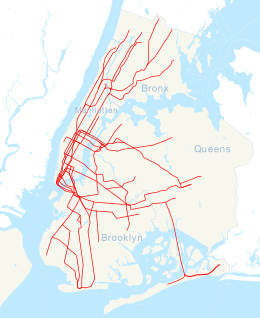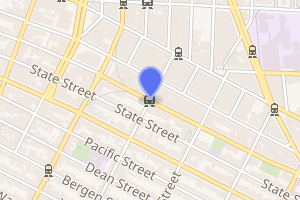Hoyt–Schermerhorn Streets station
Hoyt–Schermerhorn Streets (shown as "Hoyt-Schermerhorn" on official subway maps) is an express station of the New York City Subway, serving the IND Crosstown Line and the IND Fulton Street Line. Located at the intersection of Hoyt Street and Schermerhorn Street in Downtown Brooklyn, it is served by the A and G trains at all times, and the C train at all times except late nights.
Hoyt–Schermerhorn Streets | |||||||||||
|---|---|---|---|---|---|---|---|---|---|---|---|
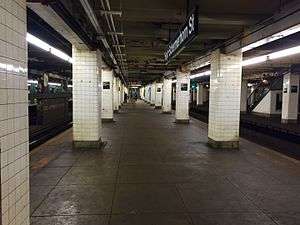 Queens-bound platform | |||||||||||
| Station statistics | |||||||||||
| Address | Hoyt Street & Schermerhorn Street Brooklyn, NY 11201 | ||||||||||
| Borough | Brooklyn | ||||||||||
| Locale | Downtown Brooklyn | ||||||||||
| Coordinates | 40°41′20.48″N 73°59′10.11″W | ||||||||||
| Division | B (IND) | ||||||||||
| Line | IND Crosstown Line IND Fulton Street Line | ||||||||||
| Services | A C G | ||||||||||
| Transit connections | |||||||||||
| Structure | Underground | ||||||||||
| Platforms | 4 island platforms (2 in passenger service) cross-platform interchange | ||||||||||
| Tracks | 6 (4 in passenger service) | ||||||||||
| Other information | |||||||||||
| Opened | April 9, 1936[1] | ||||||||||
| Station code | 175[2] | ||||||||||
| Accessible | |||||||||||
| Accessibility | Cross-platform wheelchair transfer available | ||||||||||
| Wireless service | |||||||||||
| Opposite-direction transfer available | Yes | ||||||||||
| Former/other names | Hoyt–Schermerhorn | ||||||||||
| Traffic | |||||||||||
| Passengers (2019) | 3,605,153[4] | ||||||||||
| Rank | 140 out of 424[4] | ||||||||||
| Station succession | |||||||||||
| Next north | Jay Street–MetroTech (Fulton express): A Court Street (Fulton local): no regular service Fulton Street (Crosstown): G | ||||||||||
| Next south | Lafayette Avenue (Fulton local): A Nostrand Avenue (Fulton express): A Bergen Street (Culver): G | ||||||||||
| |||||||||||
| |||||||||||
| |||||||||||
Hoyt–Schermerhorn Streets was originally built as an interchange station between the Fulton Street and Crosstown lines of the Independent Subway System (IND). Construction of the station began around 1929, and it was opened to service on April 9, 1936. Hoyt–Schermerhorn Streets has six tracks and four island platforms, with two platforms and three tracks for each direction of service. The innermost tracks in each direction originally served Crosstown Line trains, while the center tracks were supposed to serve Fulton Street express trains and the outermost tracks were supposed to serve Fulton Street local trains to Court Street. However, Court Street was only served by a shuttle train from Hoyt–Schermerhorn Streets, which stopped running in 1946.
All Fulton Street Line trains currently use the center tracks in each direction, and all Crosstown Line trains use the innermost tracks, while the outermost tracks and platforms have been abandoned. Until 1981, the outer platforms were used by special trains to Aqueduct Racetrack, which stopped on the center tracks in each direction. Today, the abandoned tracks and platforms are only used on special occasions, such as for film shoots or moving trains to the New York Transit Museum at the former Court Street station. The mezzanine has also been used for film shoots, most famously for the video of Michael Jackson's single "Bad".
History
Construction and opening
Hoyt–Schermerhorn Streets was constructed as a junction between the Fulton Street and Crosstown lines of the Independent Subway System (IND), and part of the section of the Fulton Street subway under Schermerhorn Street between Court Street and Bond Street.[5][6][7] Surveying by the New York City Board of Transportation along Schermerhorn Street began in 1928,[8][9][10] and construction began around 1929.[5][6] Property on the south side of Schermerhorn Street between Bond and Nevins Streets was condemned to facilitate the project.[11][12] Like other stations along the lines, it was constructed via shallow cut-and-cover methods, with the street covered by wooden planks.[13] In September 1929, a portion of the "plank road" above the station site collapsed.[14][15] In 1935, Sixteen Sycamores Playground was constructed on a portion of the land condemned for subway construction east of the station.[16]
The station was ceremonially opened by Mayor Fiorello LaGuardia on April 9, 1936, with the station serving both Fulton Street Line local and express trains.[1][17] The station cost approximately $3 million to construct, with the tilework costing $131,000.[17] This station began serving Crosstown Line trains on July 1, 1937, when the Crosstown Line was extended from Nassau Avenue.[18] From this station, northbound Fulton local trains were planned to continue to Court Street and terminate there. Express trains would turn north under Jay Street and continue to Manhattan via the Cranberry Street Tunnel. However, initial Fulton Street service ran entirely local at the time, as the line only ran to Rockaway Avenue. Without express service, local trains provided service to Manhattan via the express tracks at this station while the HH shuttle was instituted to serve Court Street and the local tracks/platforms.[17][19]
Later usage
On October 9, 1936, a public hearing was held to discuss the construction of a passageway between the station and the Loeser's Department Store.[20] In November 1937, the city Board of Transportation approved the construction of a 250-foot (76 m) passageway between the station and the department store.[21] Due to low ridership, the Court Street station was closed and the shuttle was discontinued in 1946.[22][23] All Fulton Street service was routed via the express tracks at this station to Jay Street – Borough Hall. This eliminated any use for the local tracks and they have been out of service since. The outer platforms were also closed until 1959, when the special service to Aqueduct Racetrack began.[24] Service ran from the lower level of the 42nd Street–Port Authority Bus Terminal station to the Aqueduct Racetrack station via the IND Eighth Avenue Line, Fulton Street Line, and IND Rockaway Line.[24] Like the lower level at 42nd Street, the outer platforms at Hoyt–Schermerhorn Streets provided a convenient place to segregate passengers who had paid the extra fare required to board the special trains. Consequently, Hoyt–Schermerhorn Streets was the only stop between 42nd Street and the racetrack.[24]
The Aqueduct service was eliminated in 1981,[25] and the outer platforms have remained out of revenue service since then.[13] The abandoned parts of the station are often used for film shoots:[13][26] for example, The Warriors and The Taking of Pelham 123 have both used Hoyt–Schermerhorn Streets as a filming location.[13] They are also used for other special functions, such as a public display of the then-new R160B subway cars in 2005.[27]
Following the 2009 death of Michael Jackson, New York City Council member Letitia James advocated renaming the station in Jackson's honor. The reasoning was that Jackson filmed the video for his song "Bad" at the station. However, James's proposal was met with resistance from the Metropolitan Transportation Authority. Other proposals to honor Michael Jackson at the Hoyt–Schermerhorn Streets station, such as hanging a plaque, were all denied.[28][29] MTA spokesperson Kevin Ortiz explained that the agency was developing guidelines for station naming-rights deals in order to raise money. In addition, naming stations after individuals could confuse riders who are traveling to a specific location or street near Hoyt–Schermerhorn.[28][29] The MTA also declined to put a plaque in the station, due to MTA guidelines banning such an action.[29][30] However, the owner of a privately owned building above one of the station's entrances agreed to paint a mural dedicated to Jackson.[31]
In 2019, the MTA announced that this station would become ADA-accessible as part of the agency's 2020–2024 Capital Program.[32]
Station layout
Track layout | |||||||||||||||||||||||||||||||||||||||||||||||||||||||||||||||||||||||||||||||||||||||||||||||||||||||||||||||||||||||||||||||||||||||||||||||||||||||||||||||||
|---|---|---|---|---|---|---|---|---|---|---|---|---|---|---|---|---|---|---|---|---|---|---|---|---|---|---|---|---|---|---|---|---|---|---|---|---|---|---|---|---|---|---|---|---|---|---|---|---|---|---|---|---|---|---|---|---|---|---|---|---|---|---|---|---|---|---|---|---|---|---|---|---|---|---|---|---|---|---|---|---|---|---|---|---|---|---|---|---|---|---|---|---|---|---|---|---|---|---|---|---|---|---|---|---|---|---|---|---|---|---|---|---|---|---|---|---|---|---|---|---|---|---|---|---|---|---|---|---|---|---|---|---|---|---|---|---|---|---|---|---|---|---|---|---|---|---|---|---|---|---|---|---|---|---|---|---|---|---|---|---|---|
| |||||||||||||||||||||||||||||||||||||||||||||||||||||||||||||||||||||||||||||||||||||||||||||||||||||||||||||||||||||||||||||||||||||||||||||||||||||||||||||||||
| G | Street level | Exit/entrance |
| M | Mezzanine | Fare control, station agent Elevator at northeast corner of Hoyt Street and Schermerhorn Street, inside 209 Schermerhorn Street. Note: Platforms are not accessible |
| P Platform level |
Westbound local | No service (Court Street/Transit Museum) |
| Island platform, not in service | ||
| Westbound express | ← ← | |
| Island platform | ||
| Southbound | ← | |
| Northbound | | |
| Island platform | ||
| Southbound express | | |
| Island platform, not in service | ||
| Eastbound local | No service (Lafayette Avenue) | |
This wide station has six tracks and four island platforms.[17][33][34] Each platform is 660 feet (200 m) long, while the entire station is approximately 143 feet (44 m) wide from north to south.[17] The centermost pair of tracks (Tracks E1 and E2) belongs to the Crosstown Line (G).[33] To the east (railroad north), they run under Lafayette Avenue while to the west (railroad south), they turn south and merge with the IND Sixth Avenue Line to form the IND Culver Line under Smith Street.[17][34][35] The next pair of tracks from the center are the express tracks (Tracks A3 and A4) of the Fulton Street Line (A and C).[33] Trains using these tracks open their doors on their left, to the inner island platforms, not on the right, to the outer ones. To the east, the C diverges to the local tracks and all four tracks continue under Fulton Street. To the west, the express tracks curve north under Jay Street and continue as the IND Eighth Avenue Line.[17][34][35][36] There is no track connection between the Fulton and Crosstown lines.[34][35][37]
The outermost pair of tracks—the Fulton Street local tracks (Tracks A1 and A2)—and the outer two island platforms are no longer used in revenue service.[33] To the west, the tracks continue under Schermerhorn Street to the decommissioned Court Street station, currently the site of the New York Transit Museum, in Brooklyn Heights.[13][17][34] Track A2 is currently out of service for the storage of trains at the New York Transit Museum.[38] Though it may be difficult to see in some of the unlighted portions of the station, a tile band is present on the trackside walls–similar in color to the Crosstown Line stations north to Flushing Avenue, and the Fulton Line stations east to Franklin Avenue–Lime (Nile) Green with a medium Kelly Green border, set in a three-high course consistent with many IND express stations.[17] Captions reading "HOYT" are present in white lettering on a black background, with no mention of "Schermerhorn". On the eastbound (southern) side, some of these captions have been stickered-over with different station names as required for film and TV shoots, though both sides have been used for filming.[39] Both northern platforms have green-painted steel I-beams, while the beams on both southern platforms are tiled.[39] Much of the ceiling at platform level is peeling due to water damage.[26][40]
Due to its width, the southern half of the station had to be built under private property on the south side of Schermerhorn Street.[11] The station's mezzanine, located over the northern half of the station directly underneath Schermerhorn Street, contains a New York City Transit Police precinct office where the operations of NYPD Transit District 30 are headquartered, and several New York City Transit Authority offices.[13][41]
Exits
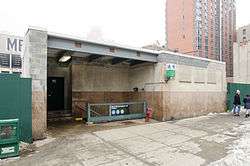
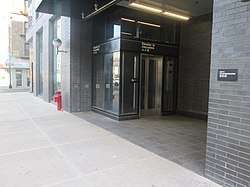
From the mezzanine, there are three staircases to each active platform, a turnstile bank, and a token booth.[35]
There are three exits. One goes to the northwestern corner of Bond and Schermerhorn Streets and is built inside a building that currently houses a Goodwill Store & Donation Center; it connects to fare control via a corridor.[42][43] Another goes to the middle of the block between Hoyt Street and Bond Street and is built inside 225 Schermerhorn Street.[42] The third exit goes close to the northeastern corner of Hoyt and Schermerhorn Streets and is built inside 209 Schermerhorn Street (also known as 45 Hoyt Street, or Hoyt & Horn).[42][43][44] This exit features an elevator to the mezzanine, which was opened in September 2018 as part of the construction of Hoyt & Horn.[45]
In addition to the open entrances, there are numerous sealed passages and exits; a count indicated eight closed street stairs. One was built into 189 Schermerhorn Street, but may have been demolished when a new building was made. Another was built into the building occupying 227 to 253 Schermerhorn Street. Two more were built into 33 Bond Street, but one may have been demolished when a new building was made. Another led to the southwestern corner of Hoyt Street and Schermerhorn Street, but is sealed on street level. Another led to the southeastern corner of Bond Street and Schermerhorn street, but is also sealed on street level. There is a closed passage next to the open Bond Street exit that exits to the west side of Bond Street between Schermerhorn Street and Livingston Street, as well as the southwestern corner of Bond Street and Livingston Street, one block north of Schermerhorn Street. The passage to Livingston Street further led to now-defunct Loeser's Department Store, which eventually became a McCrory's.[13][21][46][47] Part of the mezzanine tilework at this location still features navy blue and gold Art Deco designs, including large plaques bearing the store's logo.[13][48][49] These had previously been shop windows.[13] A control tower is located at the eastern (railroad south) end of the outer southbound platform, and is staffed at all times except late nights.[37]
Service patterns
| Bergen Street (IND Culver Line) | Jay Street – MetroTech (IND Fulton Street Line) | Court Street (IND Fulton Street Line) |
|---|---|---|
| West of the station | ||
| IND Crosstown Line G |
IND Eighth Avenue Line tunnels A C |
IND Fulton Street Line to Court Street no regular service |
| In the station | ||
| innermost tracks G |
center tracks A C |
outermost tracks no regular service |
| East of the station | ||
| IND Crosstown Line G |
IND Fulton Street Line express A |
IND Fulton Street Line local A C |
| Fulton Street (IND Crosstown Line) | Nostrand Avenue (IND Fulton Street Line) | Lafayette Avenue (IND Fulton Street Line) |
In popular culture
The unused portions of the Hoyt–Schermerhorn Streets station have appeared in several films, TV episodes, and videos.[13][26] The station was featured in The Wiz (1978) in which the characters find themselves in a strange Emerald city subway with evil monsters such as chomping trashcans and subway columns that move and try to trap the characters.[50] The station was also featured in the Eddie Murphy comedy Coming to America (1988),[26] as well as in Teenage Mutant Ninja Turtles (1990).[51] The Warriors (1979), Crocodile Dundee (1986) and Crocodile Dundee II (1988), and The Taking of Pelham 123 (2009) have also filmed at Hoyt–Schermerhorn Streets.[13][51][52]
The Hoyt–Schermerhorn Streets station's mezzanine was the main setting for the filming of Michael Jackson's music video/short film for his hit 1987 single "Bad",[28][29][31][52] as well as "Weird Al" Yankovic's parody, "Fat".[31] The opening scene of the Law & Order episode "Subterranean Homeboy Blues" (1990) was filmed in this station.[53] The song is referenced in the title of Leikeli47's song "Hoyt and Schermerhorn" from Acrylic.[54]
References
- "NEW SUBWAY LINK OPENED BY MAYOR; He Tells 15,000 in Brooklyn It Will Be Extended to Queens When Red Tape Is Cut". The New York Times. April 9, 1936. ISSN 0362-4331. Retrieved August 15, 2016.
- "Station Developers' Information". Metropolitan Transportation Authority. Retrieved June 13, 2017.
- "NYC Subway Wireless – Active Stations". Transit Wireless Wifi. Retrieved November 13, 2019.
- "Facts and Figures: Annual Subway Ridership 2014–2019". Metropolitan Transportation Authority. 2020. Retrieved May 26, 2020.
- Snapp, Fletcher G. (April 24, 1929). "Newtown Creek Tunnel First Tube of Kind Bored Without Compressed Air". Brooklyn Daily Eagle. p. 3. Retrieved August 28, 2016 – via Newspapers.com.
- "Progress is Rapid on 8th Av. Subway: Board's Engineers Report Spurt in Building Is Likely to Open the Line in July, 1930" (PDF). The New York Times. May 26, 1930. Retrieved August 28, 2016.
- "New Fulton Street Subway Officially Started as Byrne Turns Earth; Ground is Broken For Subway Line Along Fulton St.; Byrne Turns First Spade of Arlington Pl. Earth as Merchants Applaud". Brooklyn Daily Eagle. April 17, 1929. p. 4. Retrieved August 28, 2016 – via Newspapers.com.
- Pullis, G.W. (September 23, 1928). "Smith Street between Schermerhorn Street and State Street along the 8th Avenue IND Line". New York Transit Museum. Retrieved August 28, 2016.
- Foley, A.J. (November 22, 1929). "Baptist Temple on 3rd Ave. & Schermerhorn St.: IND Crosstown Line". New York Transit Museum. Retrieved August 28, 2016.
- Pullis, G.W. (October 20, 1929). "Schermerhorn Street, Brooklyn, New York". New York Transit Museum. Retrieved August 28, 2016.
- "City Will Raze Church to Make Way for Tubes: Action Will Be Started Soon to Get Property of Our Lady Mercy". Brooklyn Daily Eagle. January 8, 1930. p. 19. Retrieved August 28, 2016 – via Newspapers.com.
- "Church of Our Lady of Mercy (Roman Catholic)". American Guild of Organists. Retrieved August 28, 2016.
- Jonathan Lethem (December 18, 2007). "3". The Disappointment Artist: Essays (PDF). Knopf Doubleday Publishing Group. pp. 43–58. ISBN 978-0-307-42840-0. Retrieved August 28, 2016.
- Foley, A.J. (September 9, 1929). "Plank Road Collapse Along Schermerhorn Street; IND Crosstown Line". New York Transit Museum. Retrieved August 28, 2016.
- Foley, A.J. (September 9, 1929). "View of Plank Road Collapse Along Schermerhorn Street; IND Crosstown Line". New York Transit Museum. Retrieved August 28, 2016.
- "Sixteen Sycamores Playground: History". New York City Department of Parks and Recreation. Retrieved October 17, 2018.
- Egan, Leo (April 5, 1936). "Brooklyn's New $53,000,000 Subway Line Ready to Open Wednesday Night". Brooklyn Daily Eagle. p. 16. Retrieved August 28, 2016 – via Newspapers.com.
- "New Crosstown Subway Line Is Opened". Brooklyn Daily Eagle. July 1, 1937. Retrieved December 24, 2015.
- "Two Subway Links Start Wednesday". The New York Times. April 6, 1936. p. 23. Retrieved October 7, 2011.
- "Notice of Public Hearing". Brooklyn Daily Eagle. October 6, 1936. p. 28. Retrieved August 28, 2016 – via Newspapers.com.
- "Loeser's Gets Tunnel To Join With Subway". Brooklyn Daily Eagle. November 21, 1937. p. 3. Retrieved August 28, 2016 – via Newspapers.com.
- Jaffe, Alfred (December 6, 1946). "Borough Subway Relief Still 2 or 3 Years Off". Brooklyn Daily Eagle. pp. 1, 5. Retrieved October 9, 2015 – via Newspapers.com.
- Blauvelt, Paul (June 9, 1946). "Shortages Snarl $50,000,000 Tube Links". Brooklyn Daily Eagle. p. 21. Retrieved October 9, 2015 – via Newspapers.com.
- "Special Aqueduct Subway Service: Premium Fare Trains Started By T.A. To Local Race Track". Wave of Long Island. Fultonhistory.com. September 17, 1959. p. 5. Retrieved August 15, 2016.
- Crist, Steven (October 11, 1981). "John Henry and 8-1 Timely Writer Win". The New York Times. Retrieved October 12, 2009.
- O'Neill, Natalie (March 29, 2012). "Peeling ceiling is latest problem for G train riders". Brooklyn Paper. Retrieved August 28, 2016.
- Chan, Sewell (November 30, 2005). "New Subway Cars Promise All Kinds of Information". The New York Times. Retrieved October 27, 2007.
- Calder, Rich (September 2, 2009). "Jacko Off Tracko". New York Post. Retrieved September 9, 2009.
- Lee, Jennifer S. (August 28, 2009). "A Compromise for the Michael Jackson Subway Station". The New York Times. Retrieved August 28, 2016.
- Fernandez, Manny (August 27, 2009). "Brooklyn Sets Aside a Day for a Michael Jackson Party". The New York Times. Retrieved September 20, 2016.
- Kuntzman, Gertz (February 17, 2010). "Jacko on tracko! King of Pop to adorn subway entrance". Brooklyn Paper. Retrieved February 5, 2018.
- "Press Release - MTA Headquarters - MTA Announces 20 Additional Subway Stations to Receive Accessibility Improvements Under Proposed 2020-2024 Capital Plan". MTA. December 19, 2019. Retrieved December 24, 2019.
- "Board of Inquiry Report: Track Worker M. Franklin, Pass #291103 Fatal Accident, April 29, 2007 Board of Inquiry Final Report July 31, 2007" (PDF). nytimes.com. Metropolitan Transportation Authority. July 31, 2007. Retrieved November 7, 2017.
- Marrero, Robert (January 1, 2017). "472 Stations, 850 Miles" (PDF). B24 Blog, via Dropbox. Retrieved April 27, 2018.
- "Review of the G Line: Appendices" (PDF). Metropolitan Transportation Authority. July 10, 2013. Retrieved October 28, 2015.
- "Review of the A and C Lines" (PDF). Metropolitan Transportation Authority. December 11, 2015. Retrieved January 19, 2016.
- "Review of the G Line" (PDF). mta.info. Metropolitan Transportation Authority. July 10, 2013. Retrieved August 2, 2015.
- Reddy, Alla (2011). "Subway Service Performance Measurement at New York City Transit: Recent Advancements" (PDF). lexciestuff.net. Retrieved November 7, 2017.
- "The New York City Filming Locations of The Warriors – Part 3". Scouting New York. May 22, 2013. Retrieved September 10, 2016.
- "Audit Report on the New York City Transit Authority's Track Cleaning and Paining of the Subway Stations" (PDF). nyc.gov. Office of the New York City Comptroller. May 14, 2015. Retrieved August 28, 2016.
- "Transit Bureau - Transit District 30". nyc.gov. New York City Police Department. Archived from the original on August 30, 2016. Retrieved August 28, 2016.
- "MTA Neighborhood Maps: Hoyt-Schermerhorn (A)(C)(G)" (PDF). mta.info. Metropolitan Transportation Authority. September 2018. Retrieved November 15, 2018.
- "MTA Neighborhood Maps: Downtown Brooklyn" (PDF). mta.info. Metropolitan Transportation Authority. 2015. Retrieved July 28, 2016.
- "Map of NYC Subway Entrances". NYC Open Data. City of New York. Retrieved July 10, 2018.
- "Going down! Elevator-equipped entrance debuts at Hoyt-Schermerhorn station". Brooklyn Paper. October 12, 2018. Retrieved November 15, 2018.
- Walsh, Kevin (December 14, 2009). "BOERUM HILL, Brooklyn". Forgotten New York. Retrieved August 28, 2016.
- Spellen, Suzanne (January 7, 2010). "Walkabout: A Fortune in Lace, Part 2". Brownstoner. Retrieved May 7, 2020.
- Fox, Margalit; Robinson, George (August 17, 2003). "F.Y.I." The New York Times. Retrieved August 28, 2016.
- Walsh, Kevin (June 7, 1998). "THE SUBWAYS REMEMBER with ancient signage". Forgotten New York. Retrieved August 28, 2016.
- New York Magazine (in Italian). New York Media, LLC. p. 92. Retrieved February 5, 2018.
- "Goodfellas to Ghost: a movie scout's favourite New York City film locations – in pictures". the Guardian. May 13, 2015. Retrieved February 5, 2018.
- Spencer, Luke J. (March 31, 2016). "This Brooklyn Subway Station Was the Setting for Michael Jackson's "Bad" Video". Slate Magazine. Retrieved October 31, 2018.
- Colon, David (August 4, 2016). "The Best Subway Stations In NYC". Gothamist. Archived from the original on February 25, 2018. Retrieved February 5, 2018.
- "Leikeli47 – Hoyt and Schermerhorn".
External links
| Wikimedia Commons has media related to Hoyt–Schermerhorn Streets (New York City Subway). |
- nycsubway.org – IND Fulton: Hoyt–Schermerhorn Street
- Abandoned Stations: Court St, and Hoyt-Schermerhorns Sts platforms
- The Subway Nut — Hoyt–Schermerhorn Streets Pictures
- Hoyt Street entrance from Google Maps Street View
- 225 Schermerhorn Street entrance from Google Maps Street View
- Bond Street entrance from Google Maps Street View
- Platforms from Google Maps Street View
